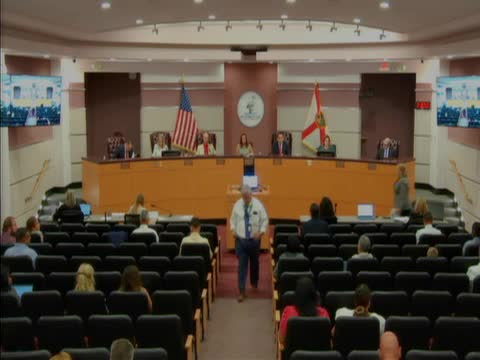Port St. Lucie adopts 2026 legislative program focused on property-tax flexibility, water projects and transportation funding
October 13, 2025 | Port St. Lucie, St. Lucie County, Florida
This article was created by AI summarizing key points discussed. AI makes mistakes, so for full details and context, please refer to the video of the full meeting. Please report any errors so we can fix them. Report an error »

The Port St. Lucie City Council on Monday adopted its proposed 2026 state legislative program, directing the city's lobbyists to press lawmakers for property-tax flexibility, water-quality infrastructure, transportation funding and local project support.
The program was presented by the city's legislative team and lobbyist Adam Mayer during a review of the previous session, budget outcomes and near-term priorities. After brief council discussion the council voted to adopt the package by voice vote; the motion carried.
The adopted priorities align with the city's strategic plan and include requests for state appropriations and policy support for: flexibility in property-tax reform to reflect Port St. Lucie's local circumstances; funding and permitting support for the Rangeline reverse-osmosis facility and deep injection wells; continued funding for Everglades and Indian River Lagoon restoration; transportation and economic development funding; design funding for the Port St. Lucie Community Center; and land acquisition and policies supporting high-performance public spaces.
Adam Mayer, who summarized the 2025 legislative session and the implications for local requests, highlighted a 2025 state budget that totaled about $113 billion, with major line items in health care and education and a stronger-than-expected revenue picture. Mayer (representing the city's contracting lobbying team) told the council the governor and legislative leaders had been focused on spending restraint and certain high-priority items such as immigration and rural economic initiatives, and that the city's delegation had been active backing local projects in the final budget.
City staff said the proposed program was developed with the city's legislative team and a new internal legislative strike team made up of staff across departments. Kate Parmley (city staff) told the council the priorities had been coordinated with the city's federal program and with St. Lucie County and the Florida League of Cities initiatives.
Council members asked for public outreach and local explanation of how the property-tax priority would affect city finances and services; staff agreed to prepare public-facing material and briefings for residents. The council also asked that staff and the lobbying team continue to follow several bills flagged as likely to return in 2026, including ones affecting local regulation of land use and redistricting.
The council voted to approve the 2026 legislative program after the presentation; adoption allows staff and the city's lobbyists to pursue bill sponsors and funding conversations in Tallahassee as the session calendar advances.
The city will present the package to the delegation beginning the next day, staff said, and prioritize sponsors for projects that align with legislators' district interests.
The program was presented by the city's legislative team and lobbyist Adam Mayer during a review of the previous session, budget outcomes and near-term priorities. After brief council discussion the council voted to adopt the package by voice vote; the motion carried.
The adopted priorities align with the city's strategic plan and include requests for state appropriations and policy support for: flexibility in property-tax reform to reflect Port St. Lucie's local circumstances; funding and permitting support for the Rangeline reverse-osmosis facility and deep injection wells; continued funding for Everglades and Indian River Lagoon restoration; transportation and economic development funding; design funding for the Port St. Lucie Community Center; and land acquisition and policies supporting high-performance public spaces.
Adam Mayer, who summarized the 2025 legislative session and the implications for local requests, highlighted a 2025 state budget that totaled about $113 billion, with major line items in health care and education and a stronger-than-expected revenue picture. Mayer (representing the city's contracting lobbying team) told the council the governor and legislative leaders had been focused on spending restraint and certain high-priority items such as immigration and rural economic initiatives, and that the city's delegation had been active backing local projects in the final budget.
City staff said the proposed program was developed with the city's legislative team and a new internal legislative strike team made up of staff across departments. Kate Parmley (city staff) told the council the priorities had been coordinated with the city's federal program and with St. Lucie County and the Florida League of Cities initiatives.
Council members asked for public outreach and local explanation of how the property-tax priority would affect city finances and services; staff agreed to prepare public-facing material and briefings for residents. The council also asked that staff and the lobbying team continue to follow several bills flagged as likely to return in 2026, including ones affecting local regulation of land use and redistricting.
The council voted to approve the 2026 legislative program after the presentation; adoption allows staff and the city's lobbyists to pursue bill sponsors and funding conversations in Tallahassee as the session calendar advances.
The city will present the package to the delegation beginning the next day, staff said, and prioritize sponsors for projects that align with legislators' district interests.
View full meeting
This article is based on a recent meeting—watch the full video and explore the complete transcript for deeper insights into the discussion.
View full meeting